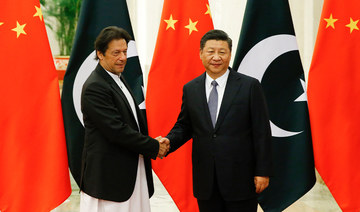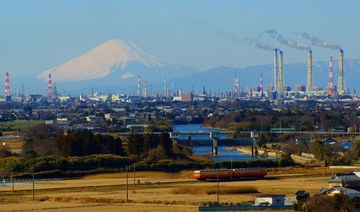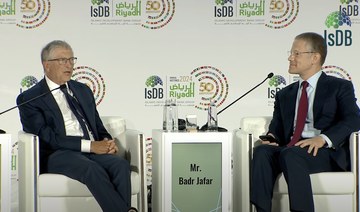ISLAMABAD: Pakistan International Airlines, the nation’s flag carrier, will not appeal against a six-month ban imposed on its lucrative flights to European locations, three officials said, in a blow to the ailing airline’s pre-pandemic turnaround plans.
The European Union Aviation Safety Agency (EASA) banned PIA from flying to the bloc in June over safety concerns, days after the country grounded dozens of its pilots over allegedly dubious qualifications.
“We’ve decided that filing an appeal at this stage will be counter-productive,” PIA spokesman Abdullah Khan told Reuters.
The deadline to appeal expired on Aug 31.
Two civil aviation officials told Reuters that all the stakeholders agreed that an appeal would be a futile exercise until reforms in the regulatory framework and a full probe into the pilots’ scandal were completed.
The civil aviation officials declined to be named. The government and the Pakistan Civil Aviation Authority did not respond to requests for comment.
Opting not to appeal means the ban will remain in force until the end of 2020 — a year in which PIA was to implement a new business plan aimed at making the company profitable by 2023 — via a route rationalization, increasing flights and adding new sectors like Amsterdam.
With more than $4 billion in accumulated losses, PIA was already struggling financially when flights were grounded in March because of the pandemic. Just as it resumed operations in May, a domestic PIA flight crash in Karachi killed 97 of 99 people on board.
An initial inquiry pointed to a number of safety failures, and sparked a disclosure from authorities that nearly a third of PIA’s pilots may have falsified their qualifications, prompting EASA, the US Federal Aviation Administration (FAA) and other regulators to ban PIA flights.
PIA had halted commercial flights to the United States before the ban, but was flying charter flights and had planned to restart operations there soon.
The European ban hurt its revenues from overseas sectors such as London, Manchester and Birmingham that were to be a cornerstone of PIA’s turnaround strategy.
The business plan put together by the PIA management last year saw those UK routes and new European destinations as key to its turnaround strategy, which also involved inducting at least seven new aircraft to its fleet by 2022.
The year “2020 would be a break-even year followed by return to profitability in 2023,” said the turnaround plan, reviewed by Reuters. It has not been made public.
The expansion plans are now on hold, and the airline plans to revise its turnaround strategy in consultation with the International Air Transport Association (IATA), said PIA’s Khan.
IATA, which is to begin an operational safety audit of PIA this week, said the audit process was standard practice after aircrafts of registered airlines met with accidents.
In an emailed response to Reuters, Albert Tjoeng, IATA’s Assistant Director of Corporate Communications for Asia Pacific, said IATA could not confirm or discuss the body’s consulting projects keeping in view commercial confidentiality.
“It’s a routine audit consequent to which each airline gets an operational clearance certificate. PIA teams are all geared up for the audit,” said PIA’s Khan.
As stated in its turnaround strategy, PIA’s plans to divest non-core businesses such as food catering and ground handling remain on track and it is also set to hire an international consultant to advise on legacy debt, said Khan.
The business plan noted that PIA’s share of international flight traffic into Pakistan had fallen to 27% in 2019 down from 42% a few years prior.
Aside from operational issues, the report cited competition from Middle Eastern airlines as one of the main reasons behind the market share decline, and it proposed that Pakistan revisit its open skies strategy to allow PIA to be more competitive.
The recent bans however, risk further denting PIA’s market share with carriers such as Virgin Atlantic recently announcing direct flights into Pakistan to fill the PIA void.
The new projections of PIA’s market share are being calculated, its spokesman said, adding the airline’s management believes the decline on an annual basis will not be “as brutal as predicted,” due to the pandemic slowing down global traffic.
Pakistan’s flag carrier PIA to not appeal EU flight ban, will review turnaround strategy
https://arab.news/2tpem
Pakistan’s flag carrier PIA to not appeal EU flight ban, will review turnaround strategy
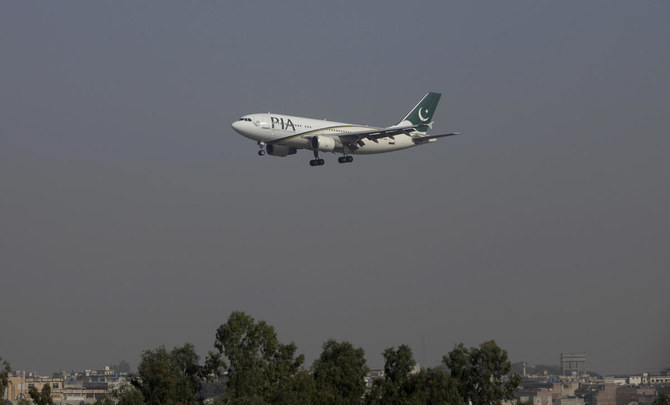
- The European Union Aviation Safety Agency banned PIA from flying to the bloc in June over safety concerns
- Opting not to appeal means the ban will remain in force until the end of 2020
PIF’s tourism investment arm Asfar to develop the city of Hail as next destination, CEO reveals
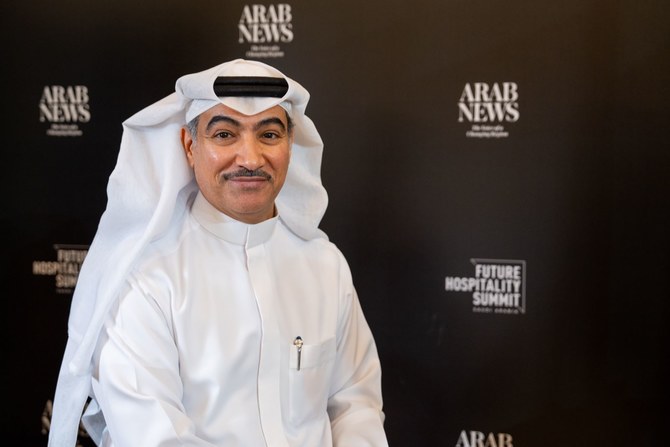
RIYADH: Saudi Arabia’s northwestern city of Hail will be the fifth destination development of Saudi Tourism Investment Co., the firm’s CEO has revealed.
Speaking to Arab News on the sidelines of the Future Hospitality Summit, Fahad bin Mushayt announced the plan, which comes after the activation of the company’s projects in Al-Baha, Yanbu, Al-Ahsa, and Taif.
The projects have all been launched within one year of the Public Investment Fund-owned firm – also known as Asfar – being unveiled.
The company is mandated to invest in new projects and develop attractive travel destinations, incorporating hospitality, tourist attractions, retail, and food and beverage offerings in cities across Saudi Arabia.
Bin Mushayt said: “In almost one year, Asfar is already playing in four destinations, with Hail coming soon, so I can reveal that.”
The entity is working to bridge the gap between the public and the private sector, as well as the local community, to create unique experiences that abide by the DNA of both the nation and the cities themselves, the executive noted.
This notion came to life during the summit, where the company signed a number of agreements with hospitality developers to launch four asset classes in the city of Yanbu.
Among them, Asfar announced the signing of investment agreements with Baheej, a joint venture between the company and the Tamimi-AWN alliance, as well as the Royal Commission for Yanbu.
“This morning, we announced our partnership with Curtain Hospitality, and they are going to be the operator of our resort in Yanbu, under the brand called Cloud 7. So the structure usually involves us and the developer as an investor, and they bring the know-how to build real estate and hospitality,” he said during the second day of the event.
The concept of Yanbu as Saudi Arabia’s most up-and-coming “second-tier city” was not limited to Asfar’s CEO alone.
Speaking on a panel at the summit alongside Mushayt, Abdulrahman Al-Bassam, a board member of Baheej, further emphasized these ideas, stating: “Yanbu is going to be the gateway of the new Red Sea Riviera, with four different asset classes expected to be operational by 2027.”
Adhering to its mandate, Asfar selects a different private sector partner to develop each of their destinations, the CEO explained, saying: “We are here to empower the private sector, to encourage them, to encourage them to go and invest with us. And we give them a lot of incentives.”
He acknowledged that those companies put their money into the subsidiary. However, Mushayt emphasized that they provide “a lot of incentives” as a semi-government entity empowered by PIF, the Ministry of Tourism, and the Ministry of Investment.
The PIF subsidiary utilizes a mix of domestic and foreign investments to empower its initiatives, focusing on operators that are suitable for the needs of the project, Mushayt said.
“The operator, if it’s a hotel operator, we bring a hotel operator; if it’s an adventure park operator, we bring a theme park. In fact, we have a theme park now, and we’re talking to international operators,” he said.
The Asfar CEO further revealed that they have a resort in Yanbu that would require cruises, “so we’re talking to Cruise Saudi, and we’re talking to another international player.”
He added: “It’s a mix of foreign and local operators, investors, and our hospitality management companies.”
HR development fund helps another 74k Saudis get private sector jobs, figures show

RIYADH: Almost 74,000 Saudi nationals received help securing private sector jobs in the first quarter of 2024 by the Kingdom’s Human Resources Development Fund.
The body supported the hiring of 73,878 citizens over the period, as offering advising, training, and empowerment services to more than 1.1 million individuals.
Additionally, during the same period, the organization provided services to more than 72,000 private sector firms across various industries throughout the Kingdom. Approximately 88 percent of these establishments were small and medium-sized businesses.
Saudi imports, exports increase despite regional tensions

RIYADH: Saudi Arabia’s imports and exports increased 5 percent in the first quarter of 2024 despite the tension in the region, according to a senior official.
In November 2023, the Saudi Ports Authority, known as Mawani, announced a 5.31 percent increase in container handling across all seaports in October. A total of 741,905 twenty-foot equivalent units were processed, compared to 704,486 a year before.
In an interview with Al-Ekhbariya TV channel on the sidelines of the Logistic Integration Forum 2024, held on April 29 in the Eastern Province, Minister of Transport and Logistic Services Saleh Al-Jasser noted that this growth stemmed from collaborative efforts between the public and private sectors.
IsDB Group annual meetings conclude with 85 agreements worth over $8bn
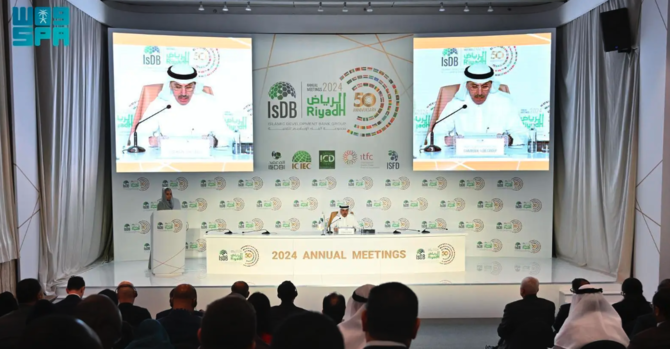
RIYADH: As many as 85 agreements worth over $8 billion were signed across diverse sectors during the recently concluded annual meetings of the Islamic Development Bank Group.
This stands in contrast to the last year’s meetings, which recorded only 77 financing agreements, totaling $5.4 billion.
Speaking at the concluding press briefing, IsDB Chairman Mohammed bin Sulaiman Al-Jasser disclosed the signing of financing agreements between the group's institutions, 38 member countries, and 22 international financial institutions, covering diverse projects.
He lauded the continuous backing of the group by Saudi leadership, citing it as a testament to the Kingdom’s commitment to global cooperation and advancement.
Highlighting the significance of this year’s gatherings, the chairman mentioned that they included meetings of the IsDB Group’s councils and over 27 consequential side events.
These sessions brought together distinguished intellectuals, experts, and researchers from various developmental domains, with a total of more than 3,750 participants.
Notably, representatives from approximately 55 international and regional partner organizations, including 23 institutional heads, were present.
Detailing the Private Sector Forum’s activities, Al-Jasser noted the participation of over 1,500 delegates from more than 60 nations. The forum, comprising 17 events, facilitated the signing of over 60 agreements amounting to approximately $6.5 billion.
Over the past 50 years, the IsDB has played a significant role in progress by funding developmental projects exceeding a total value of $182 billion, according to the chairman.
These projects have encompassed diverse vital areas, ranging from basic infrastructure and agriculture to various strategic sectors such as health, education and energy, as well as trade, and Islamic finance.
He emphasized that the discussions and exchanges during the meetings provided valuable insights and success stories crucial for fostering sustainable social and economic development. He affirmed that the outcomes would transform the IsDB’s future initiatives and strategic partnerships.
The issuance of the “Golden Jubilee Declaration” by the IsDB Board of Governors, acknowledging the bank’s pivotal role and achievements, was also highlighted by Al-Jasser.
The declaration outlined key future priorities, including enhancing governance, expanding concessional financing, and advancing Islamic finance and cooperation in Southern countries.
In conclusion, Al-Jasser reiterated the theme of the annual meetings – “Cherishing our Past, charting our Future: Originality, Solidarity and Prosperity” – underscoring its significance as a guiding principle for the IsDB’s trajectory.
He emphasized the organization’s commitment to drawing inspiration from past achievements, learning from historical lessons, and leveraging current challenges and opportunities to forge a brighter future.
Last year, the IsDB Group announced several projects with 24 member countries aimed at addressing pressing challenges hindering growth in the Global South, with a focus on health, agriculture, and food security, as well as initiatives targeting small and medium enterprises, education, and humanitarian assistance, among others.
Saudi’s Ma’aden completes 10% acquisition of Brazil’s Vale Base Metals

RIYADH: Saudi Arabian Mining Co., also known as Ma’aden, has announced that it has completed the 10 percent acquisition of Brazil’s Vale Base Metals.
Ma’aden, which is majority-owned by the Public Investment Fund, said that its joint venture, Manara Minerals Investment Co., finalized the purchase, according to a Tadawul statement.
This move will boost the growth of the Kingdom’s mining sector in line with the objectives of the Vision 2030 initiative to diversify the Saudi economy away from oil.
It follows Ma’aden’s announcement in July 2023 that its joint venture had signed a binding agreement to acquire the stake for $26 billion as part of a strategy to invest in global mining assets.
“This investment is an important milestone for Manara Minerals. Through our investment in VBM, we are increasing the supply of strategic minerals and enabling Saudi Arabia to play a growing role in the global energy transition supply chains,” Robert Wilt, executive director of Manara Minerals and CEO of Ma’aden, said at the time in a statement.
“Our proactive approach is a step further towards Saudi Vision 2030. It will support local industrial development, create jobs across the Kingdom, and strengthen the position of the mining sector as the third pillar of the economy,” Wilt added at the time.



